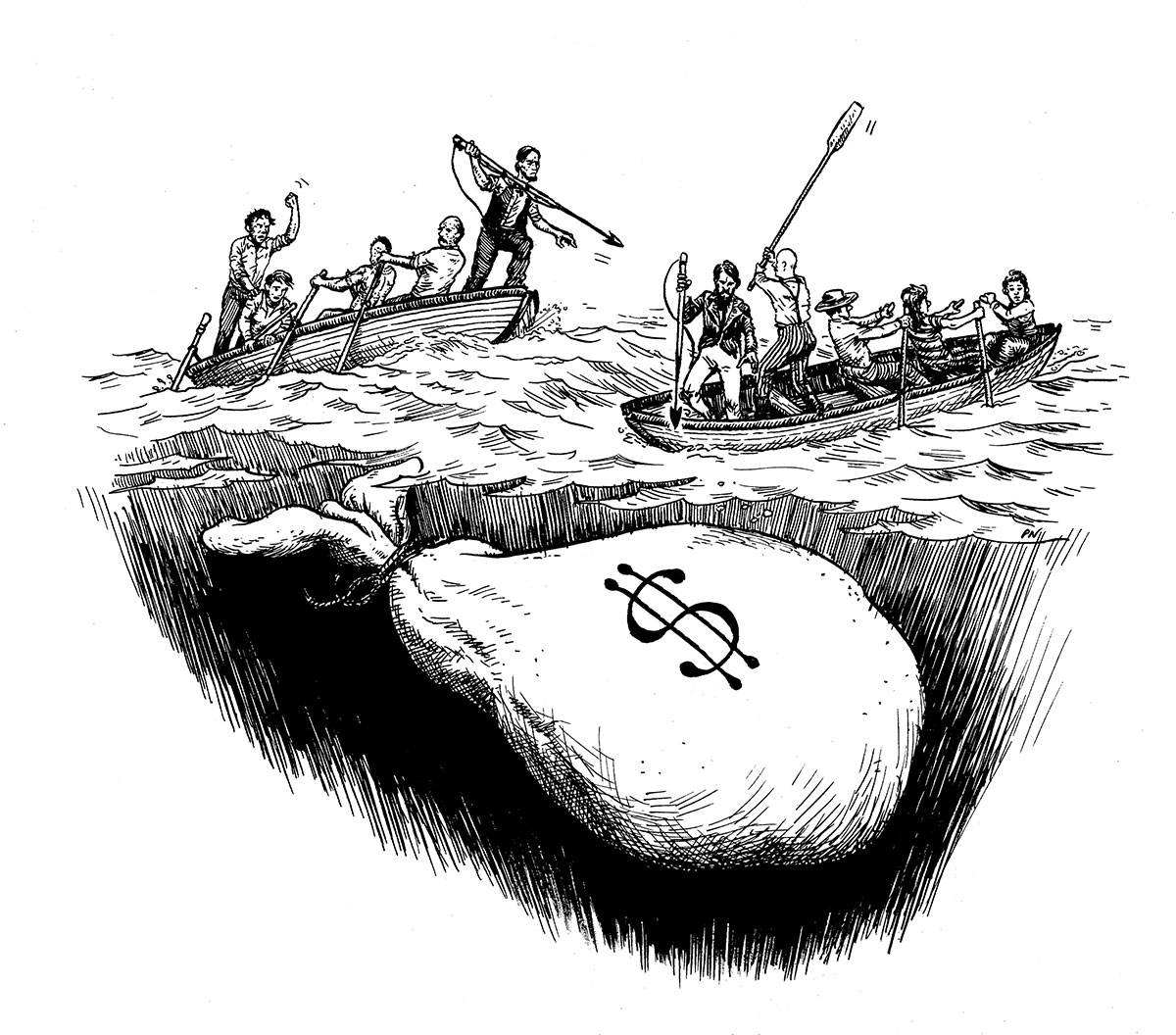
The Pacific Ocean off Southern California’s coast generates opportunities for businesses to profit from selling boats, seafood and cruises. But our waters also provide chances for capitalistic mischief. Though it’s difficult to imagine, tempers have flared in a money-making endeavor you’d probably guess would inspire more joy than conflict: whale watching.
Boats regularly take excited tourists and locals on two- or three-hour ocean cruises, offering the hope that giant whales or pods of dolphins will emerge from the depths to perform awe-inspiring acrobatics. But behind the scenes, two hostile groups of whale-watching entrepreneurs are competing for those customers and the millions of dollars in annual income they produce.
This fight consuming thousands of hours of high-skilled lawyering has taken place on three battlefields: wharves, online advertising and court. Two years ago, the whale-watching dispute prompted attorneys for Long Beach-based Harbor Breeze Corporation and L.A. Waterfront Cruises LLC to file a federal lawsuit against Orange County’s Newport Landing Sportfishing Inc., Davey’s Locker, Ocean Explorer Inc. and Freelance Sportfishing Inc.
“This is a case of relentless, intentional, serial and flagrant false advertising designed to run plaintiff’s (and all other competitors’) entire businesses into the ground,” the 61-page complaint states. “Every single whale-watching and sportfishing company from San Diego to Santa Barbara is forced to vigorously compete with the defendants for ticket sales as a result of [their] online false advertisements.”
According to Harbor Breeze’s lawsuit, the defendants have offered fake discounted ticket rates that contain “hidden” additional fees by “deceptively” claiming un-incurred expenses such as a “fuel surcharge” and “wharfage.” It also accuses them of tricking customers into believing their boats launch from “any shore city in Southern California” when they are located entirely in Newport Beach.
It particularly irks the plaintiffs that Newport Landing and Davey’s Locker targeted their home turf of San Pedro and Long Beach by buying Google ads that offer “Whale Watching Long Beach $10 Visitor and Resident Special.” Another ad claims, “Providing Whale Watching Cruises for Long Beach Visitors for Over 20 Years.” In the lawsuit, attorney Daniel C. DeCarlo called such statements untrue because “the defendants do not provide any cruise departures out of Long Beach.”

The defendants’ “false advertising has caused serious damage to the plaintiffs, who receive calls nearly every day from upset customers demanding they lower their ticket prices to match the defendants’ prices,” according to DeCarlo, who alleges his clients have lost at least $2.4 million in income in recent years. “To stay afloat, plaintiffs have been forced to dramatically lower their ticket prices (in some cases to as low as $7.50) and expend more than $10,000 per month on Google advertisements.”
But Todd R. Wulffson, one of the defendants’ attorneys, sees the lawsuit as an example of sour grapes. Wulffson told a jury in late June that Harbor Breeze provides customers “a Cadillac experience” on “super-nice,” “fantastic” and expensive yachts while his clients offer “a Chevy experience” with significantly lower prices for cheaper boats that total about $2.5 million in value.
“At the end of the day, this case is about giving consumers a choice,” he said. “We’re trying to attract the consumer who’s looking for a reasonably priced family experience. . . . The plaintiffs, unfortunately, can’t afford to compete at our price point. They can’t meet [our] $16 special or $10 special because they have almost $20 million worth of boats that have mortgages.”
In his closing argument, DeCarlo fired back. “The defendants have chosen not to give the consumer a better experience,” he said. “Good for them. That’s their choice. But I’ll tell you what, ladies and gentlemen: When my client pours all that money back into these boats to give consumers a better experience, what he’s entitled to is a level playing field. They’ve got to play fair. All he wants is fair advertising.”
After about three hours of deliberations, the jury found that the defendants made false or materially misleading statements of fact in commercial ads; those moves likely deceived a substantial segment of the market; and the plaintiffs suffered related losses.
But the panel voted to give the plaintiffs, who wanted “no less than $1 million,” zero in damages.
In recent weeks, U.S. District Court Judge Cormac J. Carney, who called the case “a whale of a tale,” considered the plaintiffs’ push for $1.5 million in attorney fees and the disgorgement of ill-gotten profits the defendants may have accumulated, funds possibly totaling more than $4 million, according to court records. He declined, noting that jurors had been instructed that Harbor Breeze was entitled to damages only if the defendants’ conduct had been proved “willful,” and yet they gave nothing.
“With respect to the defendants’ advertising on location, the evidence presented at trial showed they intended to optimize their search-engine results, not confuse consumers,” Carney observed. “There was also no evidence the defendants intended to mislead consumers with respect to their ticket prices—even if it was, in fact, misleading—since the defendants ultimately disclosed all fees prior to purchases.”
However, the plaintiffs were successful in lobbying for a post-verdict permanent injunction. “There is a public interest in ensuring honest advertising,” Carney declared. “There is also a public interest in favor of full and honest competition. The defendants argue the injunction would be moot because they have already changed their advertising. But this provides no guarantee that they will keep those changes in place.”
He added, “If the defendants repeat the name of a city other than Newport Beach in an ad or on a webpage, they will be required to clearly disclose that their cruises depart from Newport Beach. [They] must also advertise a price for a ticket that is the entire final cost of the ticket.”

CNN-featured investigative reporter R. Scott Moxley has won Journalist of the Year honors at the Los Angeles Press Club; been named Distinguished Journalist of the Year by the LA Society of Professional Journalists; obtained one of the last exclusive prison interviews with Charles Manson disciple Susan Atkins; won inclusion in Jeffrey Toobin’s The Best American Crime Reporting for his coverage of a white supremacist’s senseless murder of a beloved Vietnamese refugee; launched multi-year probes that resulted in the FBI arrests and convictions of the top three ranking members of the Orange County Sheriff’s Department; and gained praise from New York Times Magazine writers for his “herculean job” exposing entrenched Southern California law enforcement corruption.

